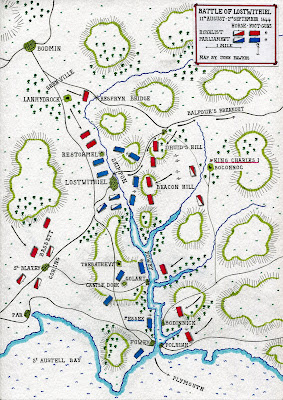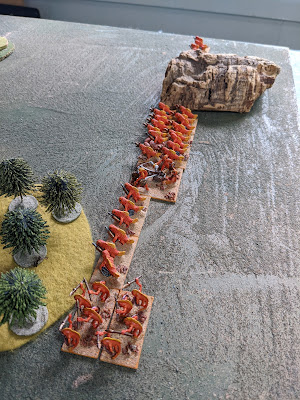The Score, from Tin Star Games is a neat little story-based RPG described as 'the fastest, slickest, coolest RPG ever made'. It is currently in beta test so, having read about it a fair bit on social media, I thought we'd give it a go. After all, it's a game about heists, and there's nothing the Kobold family like more than a good heist movie*
The players are members of a crew looking to pull off a heist. The deck of 18 cards allows them to do this in under 20 minutes, if you're quick. Here's some sample cards:
I don't plan to go into a lot of detail about the rules, since the game hasn't been released yet, but basically the cards drive everything. You use them to set up the location and target of your heist, assign skills to your characters and then to actually run the heist itself. Essentially to run the heist you have the cards in a deck, interspersed with Act cards that set the tempo of the heist itself. In some Acts things go to plan, but in others the cards are used to show the plan going off the rails. Generally everything comes good in the last act, although it is possible for the heist to fail. The real prize is the story you generate along the way.
Having created the characters, each with their own unique set of skills, you play by turning over a card. The card is assigned to one of the players who then narrates how the particular skill on the card drives the story forward - or doesn't, depending on what phase of the heist you are in. With the last card you get to describe a glorious success or, under some conditions, a total failure. The narration only need to be quick, and with only eighteen cards in play this makes for a fast game.
We played twice. Our second game fell apart a little; we narrated an end but we got bogged down in the middle by some setbacks and didn't entirely feel satisfied with the story (which was a promising one at the start - stealing stocks and bonds from a safe on the 39th floor of the Wakatomi Plaza Building ...). But the first game was great fun.
Our crew was 'Captain' Rivers, an ex-mercenary scout and electronic warfare expert, Twig, an art-school dropout with a range of dubious skills and some pronouns and finally Pal Sheridan, who claimed to be ex-NASA and who now did technical stuff for a film studio. We narrated how the crew got together and got on with the heist.
And the heist? Our target was, indirectly, the corrupt city mayor, Dorothy Vandermeer, who had embezelled a ton of money, some of which was earmarked to keep an orphanage open. We had to save the orphans! So to do so we planned to raid a reception at City Hall. Mayor Vandermeer would be there with her trophy husband, Greg, who would be wearing a set of ludicrously expensive diamond cufflinks (bought with the embezzled orphanage money, naturally). The plan? Steal the cufflinks and use the money from selling them to save the orphanage.
OK, it's a crap plot, but we were thinking fast.
The Captain did the surveillance on the night of the reception, ensuring everyone got into position, whilst Pal set up some technical stuff that would kick in later. Once inside, the Captain moved to distract the Mayor's head of security, who was an old mercenary buddy of his.
Things went wrong when the team's operations van was discovered nearby, cutting their communications. And there was a further complication when an old flame of the Captain's turned up; the lovely Gloria; she distracted him from his job of distracting the security chief.
However the plan continued. Twig made sure they had the fake cufflinks they'd prepared earlier, whilst the Captain plied Gloria and the security chief with drinks, before discretely nerve-pinching the chief, and leaving 'My friend who appears to not be able to hold his drink' in Gloria's capable and caring hands. A timely fake phone-call took the Mayor out of the reception, only for her to return a few minutes later - only this time it was Pal in disguise.
At this stage the plan required a distraction - a performance by the orphanage choir would draw everyone's attention. But the team's van had been identified as a suspicious vehicle and some of the local streets were closed off; the bus from the orphanage couldn't get through! The plan would just have to go ahead without them.
And it did. Despite the lack of distraction, Twig suddenly dropped down onto the stage on a line, held up the Mayor and Greg at gun-point, took the cufflinks and then whizzed back up to the lighting gantry with the Mayor as a hostage! Escaping through the back-stage area, they accidentally dropped the cufflinks, and the Mayor (Pal in disguise) broke free as well. Twig disappeared into the night as the leaderless security team failed to catch her. The Mayor felt indisposed and slipped off to a loo for a few moments. Pal left the building just as people wondering why the Mayor was so long in the loo saw her come out of her office instead (where she'd been tied up on a long and frustratingly strange phone-call).
And the dropped cufflinks? The fakes, obviously.
So we got the cufflinks, pawned them and saved the orphanage.
Epilogue One: The orphan choir performed at a party to celebrate the orphanage being saved, with a rendition of Toto's 'Africa'.
Epilogue Two: Gloria and the chief of security got on like a house on fire. He quit his job working for the corrupt mayor, and he and Gloria got married, living happily ever after.
OK, it was a terrible story, but we were playing fast and, most importantly, having a lot of fun doing it.
This is a neat little game that boils role-playing down to it's essence - telling stories - and really captures the vibe of the heist genre. We loved it.
If you want more information about The Score and possibly have a go at beta-testing yourself then you can find the details HERE
And The Score has the honour of being the 52nd game I've played this year! I have officially completed the project.
52 Games - Game 52
*OK, there may be several things we like more, but the point is that we like a good heist.


































































